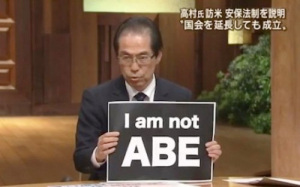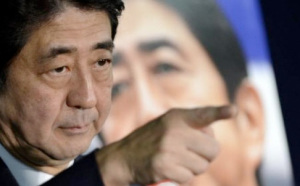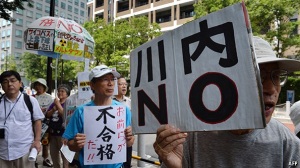Effort by Japan to Stifle News Media Is Working
TOKYO — It was an unexpected act of protest that shook Japan’s carefully managed media world: Shigeaki Koga, a regular television commentator and fierce critic of the political establishment, abruptly departed from the scripted conversation during a live TV news program to announce that this would be his last day on the show because, as he put it, network executives had succumbed to political pressure for his removal.政治的抑圧を受けた事実。
“I have suffered intense bashing by the prime minister’s office,” Mr. Koga told his visibly flabbergasted host late last month, saying he had been removed as commentator because of critical statements he had made about Prime Minister Shinzo Abe. Later in the program, Mr. Koga held up a sign that read “I am not Abe,” a play on the slogan of solidarity for journalists slain in January at a French satirical newspaper.
”I am not Abe”への内閣からの脅しがあったのですね。
Related Coverage
-
Japan Ruling Party Panel Summons Media Bosses Over News ShowsAPRIL 15, 2015
-
Japanese Media Self-Censorship Grows in Shinzo Abe's ReignFEB. 24, 2015
The outburst created a public firestorm, and not only because of the spectacle of Mr. Koga, a dour-faced former top government official, seemingly throwing away his career as a television commentator in front of millions of viewers. His angry show of defiance also focused national attention on the right-leaning government’s increased strong-arming of the news media to reduce critical coverage.
Photo
Many journalists and political experts say the Abe government is trying to engineer a fundamental shift in the balance of power between his administration and the news media, using tactics to silence criticism that go beyond anything his predecessors tried and that have frustrated many journalists. These have included more aggressive complaints to the bosses of critical journalists and commentators like Mr. Koga, and more blatant retaliation against outlets that persist in faulting the administration. At the same time, Mr. Abe has tried to win over top media executives and noted journalists with private sushi lunches.
The prime minister, who arrived in the United States on Sunday for a weeklong visit, has also appointed a new chairman to the national public broadcaster, NHK, who has declared that the network will not deviate too far from the government’s views. Members of the Abe government have openly hinted at revoking the broadcasting licenses of overly critical networks under a law that requires that TV news reports not intentionally twist facts.
Mr. Abe’s efforts have had a chilling effect on coverage at a time when he is pushing ahead with a conservative agenda to dismantle the nation’s postwar pacifist consensus and put forth more positive portrayals of Japan’s World War II-era behavior. Experts warn that muzzling the press makes it easier for the government to make big changes that might not enjoy broad popular support, such as rewriting the pacifist Constitution, or even restarting the nation’s stalled nuclear industry.
“The Abe government is showing an obsession with the media that verges on paranoia,” said Keigo Takeda, a former editor in chief at Newsweek Japan who is now a respected freelance journalist. “I have never seen this level of efforts to micromanage specific newspapers and TV programs.”パラノイアなんですね。
While government officials deny that they are trying to curtail free speech, many journalists, commentators and media experts say the government campaign has already tempered coverage of the Abe government. They say that even once feisty outlets like Hodo Station, the news program that had used Mr. Koga as a commentator, are now censoring their own coverage or removing critical voices to avoid drawing official ire.
Some criticism has also fallen on news outlets for rolling over without a fight, particularly since some of these tactics are considered routine in other democracies, like the United States. Many major news organizations have been accused of self-censorship, bringing renewed attention on what experts here say is a weak tradition among the Japanese press of serving as a watchdog on power.
The governing party is acting “like a bully who says, ‘Hey, I don’t like what you said, so meet me behind the gym,’ ” said Yukio Edano, a senior opposition lawmaker. “And the ones who meekly obey also lack self-respect as press organizations.”
This is a point conceded by many Japanese journalists, who say they have no choice but to get along with a prime minister who appears set to remain in power for several years in the absence of credible opposition. Other journalists say they do not want to suffer the fate of The Asahi Shimbun, a liberal newspaper that came under fierce criticism last fall and seemed to capitulate by cutting back on critical, investigative coverage of sensitive issues like the 2011 Fukushima nuclear accident.
Scholars describe a mood of fear spreading beyond the news media into the broader society, including in education where the Abe government is pressing textbook publishers to adhere more closely to the official line on topics like the 1937 Nanjing massacre and the use of so-called comfort women in wartime military brothels.
“These unprecedented attacks on The Asahi and other media are creating a closed conformity in which the whole society is becoming afraid to say something different,” said Tatsuro Hanada, a professor of media studies at Waseda University in Tokyo. “Abe is adeptly using this for his own political ends.”
Mr. Koga’s accusations offer a rare glimpse of how a formerly hard-hitting news program appears to have toned down its coverage.
While never a favorite of the governing Liberal Democratic Party, Hodo Station felt the pressure rise after a show in late January in which Mr. Koga criticized Mr. Abe’s handling of a hostage crisis in Syria that resulted in the deaths of the two Japanese captives. Mr. Koga and employees of the network that airs Hodo Station, TV Asahi, who asked not to be identified because they were still working there, said that before the program was even over, the network’s political reporters were getting angry calls and emails from political secretaries in the prime minister’s office.
They said the tactic seemed to succeed in turning network reporters against Hodo Station, which has a separate production staff. The reporters and their editors demanded that the program show them its scripts beforehand to ensure that coverage was “balanced,” something Hodo Station’s producer resisted. The government stepped up the pressure against the show again in February, when a top official in the Abe government, Chief Cabinet Secretary Yoshihide Suga, used an off-record briefing with journalists to speak scathingly of the “completely mistaken” comments about the hostage incident by a “television commentator.”
According to a transcript of the Feb. 24 briefing, Mr. Suga warned that the network might have broken the law by airing the comments. “If it were me, I’d tell them that they violated the broadcast law,” Mr. Suga said, laughing, according to the transcript.
Mr. Koga and others said the transcript had made its way to TV Asahi’s chairman, Hiroshi Hayakawa. “This was a warning to TV Asahi to get rid of me,” Mr. Koga said. “Suga knew this memo would be seen by all major news outlets, and be shown to Chairman Hayakawa.”
Mr. Koga said that that was exactly what happened. In February, after three and a half years of appearing at least once a month as a commentator on Hodo Station, he found out that he would no longer be back on the show. At about the same time, another critical commentator and a producer who had refused to give in to the political pressure were also removed from the show.
Mr. Koga said that move led to his outburst on March 27, his final appearance as commentator.
The network refused interview requests. Its chairman, Mr. Hayakawa, denied in a news conference that political pressure had played a role in what he called a routine decision to change the lineup of commentators. Mr. Suga has told reporters that Mr. Koga’s charges of political pressure were “baseless.”
Still, the governing party is keeping up the pressure, summoning TV Asahi executives two weeks ago to explain how Mr. Koga was allowed to make his accusations on live television. The party explained the summons by saying that those accusations may themselves have violated the broadcast law.
“Some don’t like his method, but Mr. Koga did draw public attention to the Abe government’s pressure on the media,” said Takashi Uesugi, a media critic and one-time researcher at The New York Times who runs an independent online news program. “This was an inconvenient truth for both the government and the self-censoring journalists.”
【 露骨な干渉、圧力、そして威圧。ニュースメディアの大政翼賛化を強行する安倍政権 】《前篇》
統制と管理が行き届いた日本のメディアを震撼させた、予想外の抗議「 I’m NOT Abe !」
報道機関・ニュース解説者に対する前代未聞の攻撃、ジャーナリストへの露骨な報復を行う安倍政権
報道機関の口を封じ、一般国民が反対する憲法改定・原発再稼働を実行しやすい環境を作る安倍政権
マーティン・ファクラー / ニューヨークタイムズ 4月26日
それは統制と管理が行き届いた日本のメディアを震撼させた、予想外の抗議でした。
レギュラーテレビ解説者であり、規制の権力に対して厳しい批判を繰り返してきた古賀茂明氏は、夜の生放送のニュース番組の中で予め打ち合わせが済んでいた予定原稿から急に逸れた発言をしました。
全国放送のテレビネットワークの経営陣が政治的圧力に屈し、今日を限りに古賀氏を降板させることが決定したと語ったのです。
「私はこれまでずっと、首相官邸からの攻撃にさらされてきました。」
古賀氏は前月末、明らかに仰天した様子の番組のホストに向かい、安倍首相を厳しく批判する論評を行ったために、ニュース解説者の地位を奪われることになったと語ったのです。
番組の後半で古賀氏は「 I’m NOT Abe !(私はアベじゃない!)」と書かれたサインを掲げました。
これは1月フランスの風刺新聞社のシャルリー・エブドがテロリストに衝撃された際、ジャーナリストたちが連帯を表すために掲げたサイン、「 Je suis Charlie(I am Charlie – 私はシャルリー)」をもじったものです。
そして厳しい表情のまま、数百万人の視聴者の眼前でテレビ解説者としてのキャリアを自ら投げ打った古賀氏の爆弾発言は、彼自身の問題にとどまらない大きな波紋を広げる結果となりました。
そして古賀氏の怒りに満ちた発言は、政変批判報道を封じ込めようとニュースメディアに強い圧力をかけ続ける、安部右翼タカ派政権の姿勢を浮かび上がらせることになったのです。
多くのジャーナリスト、そして政治評論家が、安倍政権はニュースメディアとの間の勢力均衡の基盤を壊し、政権側に一方的に有利になる体制を作り上げようとしていると、批判を強めています。
批判的報道を沈黙させるためこれまでの政権担当者が用い、その結果ジャーナリストの自由な活動を阻むことになった手段のすべてを使い、安倍政権は徹底して圧力を強めています。
具体的には、安倍政権に批判的な姿勢を取る報道機関の経営陣や古賀氏のようなニュース解説者に対する過去に例がない攻撃、そして独立した立場で活動するジャーナリストに対する露骨な報復などが行なわれました。
これとは対照的に、安倍首相は同政権に好意的なメディアの経営者や著名なジャーナリストに寿司を振る舞う昼食会を開催するなどして、彼らの歓心を得る工作も行っています。
さらに4月末に一週間の米国への公式訪問を行った安倍首相は、全国放送の公共放送NHKに新しい会長を据えました。
この会長は公の席で、今後NHKは政権の意に沿った報道を行うと断言したのです。
安倍政権のメンバーは、主要な放送局が事実を歪曲する報道を行ってはならないとする放送法を盾に、政権の意に逆らう放送局に対しては放送許可を取り消す可能性がある事すら公然とほのめかしました。
安倍首相が進める戦後の平和主義体制の解体、そして第二次世界大戦(太平洋戦争)中の日本の体制や行動に対しもっと肯定的評価を行うべきであるとする保守タカ派のキャンペーン、こうした安倍首相の強硬姿勢は、日本の報道を委縮させる効果を発揮しました。
専門家は報道機関の口を封じることにより、日本政府は一般国民が反対する政策をより実行しやすい環境を作ることになると警告しています。
日本国憲法の書き換え、そして窮境に陥っている日本の原子力産業界を再び大規模に稼働させる政策などです。
尊敬を集めるジャーナリストで元ニューズウィーク・ジャパンの元編集長の竹田圭吾氏が次のように語りました。
「安倍政権はジャーナリズムに対し、パラノイア(偏執症、パラノイア、妄想症、偏執病)的な姿勢で止むことの無い執着を見せています。」
「特定の新聞とテレビ番組について細部にまで、そしてこれ程まで管理・コントロールしようとする政権を私はこれまで見たことがありません。」
首相官邸の官僚たちは報道の自由に対する干渉を否定していますが、多くのジャーナリスト、ニュース解説者、そしてメディアの専門家たちはすでに多くの報道機関が安倍政権に対し、ペンを曲げてしまったと語っています。
かつては政権批判に前向きに取り組み、古賀氏のような解説者が出演していた報道ステーションのような番組ですら、現在は政府や政権与党の怒りを買うことの無いよう、内部での検閲を行い、批判的な表現を削除していると、彼らが語っています。
さらにアメリカ合衆国のような他の民主主義国家において権力側の常とう手段として用いられるやり方に屈し、放送局やメディアが戦うことなく『転向』してしまっている現状にも批判が集まっています。
〈 後篇に続く 〉
http://www.nytimes.com/2015/04/27/world/asia/in-japan-bid-to-stifle-media-is-working.html?ref=topics&_r=1
+ – + – + – + – + – + – + – + – + – + – + – + – +
グーグルの画像検索で「 political pressure japan(政治的圧力・日本) 」と入力したところ、安倍首相の写真が無数に出てきました。
「Abe」の3文字を一切入力していないにも関わらず!
世界の認識がどういうものであるかを、端的に表しています。



















